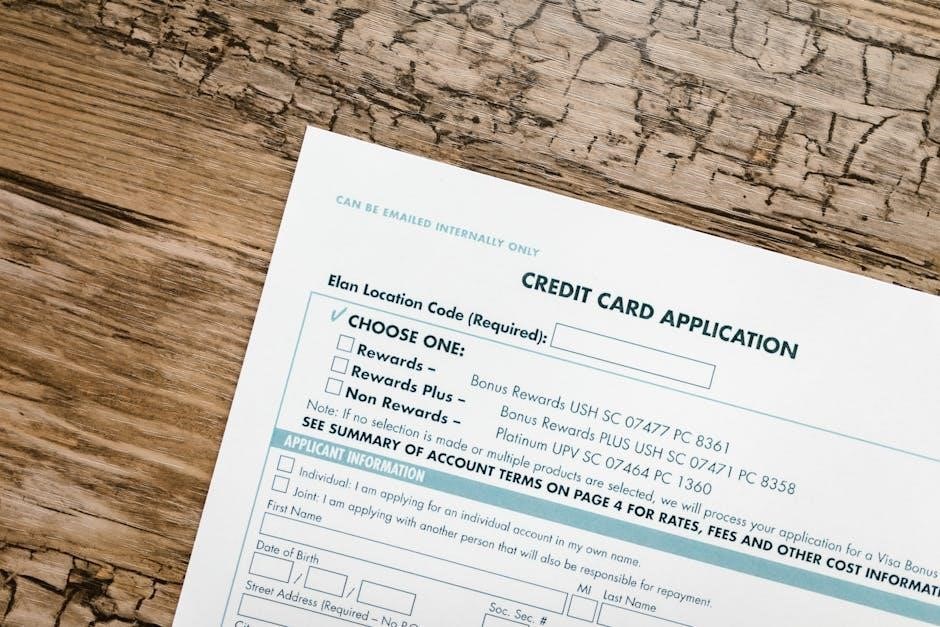
Overview of Form 410 Rental Application Ontario
Form 410 is a standardized rental application used in Ontario, designed to provide necessary tenant information to landlords, ensuring compliance with the Residential Tenancies Act, 2006.
1.1 Purpose and Importance of Form 410
The primary purpose of Form 410 is to provide landlords with essential information about potential tenants, ensuring a fair and transparent rental application process. It is mandated under Ontario’s Residential Tenancies Act, 2006, to standardize the collection of personal, financial, and rental history details. This form helps landlords assess suitability while protecting tenants from unfair practices. Its importance lies in balancing landlord needs with tenant rights, promoting legal compliance, and maintaining a structured approach to tenancy applications across the province.
1.2 Legal Framework Governing Rental Applications in Ontario
The rental application process in Ontario is governed by the Residential Tenancies Act, 2006 (RTA), which outlines landlords’ rights and tenants’ protections. Landlords must comply with this act when requesting information. They are prohibited from asking for certain personal details, such as immigration status or medical history. The RTA ensures that rental applications are fair and non-discriminatory, balancing landlord needs with tenant rights. It also regulates what information can be collected and how it must be used, ensuring transparency and legal compliance throughout the process.

Required Information on Form 410
Form 410 requires personal, employment, and financial details, along with rental history and references, to help landlords assess potential tenants effectively and responsibly.
2.1 Personal Information and Identification Details
Form 410 requires applicants to provide personal details such as full name, address, birthdate, and contact information. Identification is typically requested, including driver’s license or passport numbers, to verify identity. This information helps landlords conduct background checks and ensures the application process is transparent. Applicants may also be asked for emergency contact details. The collection of this data is governed by privacy laws, ensuring it is used solely for tenant screening purposes. Providing accurate and complete personal information is crucial for a successful rental application.
2.2 Employment and Financial Information
Form 410 requires detailed employment and financial information to assess a tenant’s ability to pay rent. Applicants must provide their job title, employer’s contact details, and monthly income. Proof of employment, such as recent pay stubs or a letter from the employer, may be requested. Financial details, including bank account information, are often required to conduct credit checks. Landlords use this data to evaluate the applicant’s financial stability and rental eligibility. Providing accurate and complete employment and financial information is essential for a smooth application process and strengthens the landlord’s confidence in the tenant’s reliability.
2.3 Rental History and References
Form 410 requires applicants to provide a detailed rental history, including the names and contact information of previous landlords. This helps landlords assess the applicant’s reliability as a tenant. Additionally, tenants are often asked to supply professional references, such as employers or property managers, to verify their credibility. It is crucial to provide accurate and honest information, as landlords may contact these references to confirm the applicant’s rental history and financial responsibility. Misrepresentation of this information can lead to application rejection or future legal consequences.
2.4 Additional Documentation Requirements
Beyond the information provided on Form 410, landlords may request additional documentation to verify the applicant’s financial stability and identity. This often includes recent pay stubs, bank statements, or tax documents like W-2 forms. In some cases, proof of employment or a letter from an employer may be required. Tenants should ensure all documents are up-to-date and valid to avoid delays in processing. Providing false or incomplete documentation can result in the rejection of the rental application or legal consequences under Ontario’s tenancy laws.

Legal Considerations for Tenants and Landlords
Form 410 rental applications in Ontario are governed by the Residential Tenancies Act, 2006, balancing tenant rights with landlord responsibilities to ensure legal compliance and fairness.
3.1 What Landlords Can and Cannot Ask For
Landlords in Ontario can request personal and financial information on Form 410 to assess tenant suitability, such as employment details, rental history, and credit checks. However, they cannot ask for sensitive information like banking passwords or unrelated personal details. The Residential Tenancies Act, 2006, ensures landlords balance their screening needs with tenants’ privacy rights, prohibiting discriminatory or invasive inquiries. This legal framework protects applicants from unfair practices while allowing landlords to make informed decisions. Proper adherence to these guidelines ensures a fair and lawful rental application process.
3.2 Tenant Rights and Protections Under Ontario Law
Under Ontario law, tenants have specific rights and protections when completing Form 410. The Residential Tenancies Act, 2006, ensures that landlords cannot request unnecessary or invasive information, safeguarding tenants’ privacy. Tenants are also protected from discrimination based on race, gender, disability, or other grounds under the Ontario Human Rights Code. Additionally, tenants have the right to fair treatment during the application process and cannot be unfairly denied housing. These protections balance the landlord’s need for tenant screening with the tenant’s right to privacy and non-discrimination.
3.3 Consequences of Providing False Information
Providing false information on Form 410 can lead to severe consequences. Under Ontario law, landlords may terminate the tenancy or pursue legal action for fraud. Tenants who misrepresent their financial status or rental history risk eviction and potential legal penalties. Additionally, a history of dishonesty can harm future rental applications, as landlords may share such information. It is crucial to ensure all details are accurate and truthful to avoid these repercussions.

The Application Process
The application process involves submitting Form 410 with required documents, allowing landlords to evaluate eligibility based on provided information, ensuring compliance with the Residential Tenancies Act.
4.1 How to Obtain and Fill Out Form 410
Form 410 can be obtained from landlords, real estate agents, or downloaded online. To fill it out, provide accurate personal, employment, and financial details. Disclose rental history, including previous landlords and references. Ensure all sections are completed thoroughly to avoid delays. Review the form for accuracy before signing, as incomplete or false information may lead to rejection. Keep a copy for your records, as this standardized form is essential for landlords to assess tenant eligibility under Ontario’s rental regulations.
4.2 Submitting the Application and Supporting Documents
Once completed, submit Form 410 along with required documents, such as proof of employment, bank statements, and photo ID, to the landlord or property manager. Ensure all information is accurate and truthful, as false details may result in application rejection. Applicants may also need to provide consent for credit or background checks. Submitting the form promptly increases the likelihood of approval. Keep a copy of the submitted application and documents for personal records, as this process is critical for landlords to evaluate tenant suitability under Ontario’s rental application standards.
4.4 Understanding the Landlord’s Evaluation Process
After submitting Form 410, landlords evaluate applications by reviewing credit scores, employment stability, rental history, and references. They may conduct background or credit checks to assess reliability. Landlords prioritize applicants with consistent income, positive references, and a history of timely payments. They may also contact previous landlords and employers to verify information. Providing accurate and complete details ensures a fair evaluation. The process aims to identify suitable tenants while protecting both parties’ interests under Ontario’s rental laws. Understanding this process helps applicants prepare thoroughly and improve their chances of approval.

Tips for Tenants Filling Out Form 410
Be honest and provide accurate information to avoid issues. Ensure all sections are filled completely and legibly. Prepare for background and credit checks, and have references ready.
5.1 Ensuring Accuracy and Completeness
It is crucial to provide accurate and complete information on Form 410 to avoid delays or rejection. Double-check all personal, employment, and financial details for correctness. Ensure all sections are filled out legibly, and required documents, such as pay stubs or bank statements, are attached. Incomplete applications may result in processing delays, while false information can lead to legal consequences or denial of tenancy. Tenants should review the form thoroughly before submission to confirm all details are truthful and up-to-date.
5.2 Preparing for Background and Credit Checks
Landlords in Ontario often conduct background and credit checks as part of the rental application process. Tenants should be prepared by reviewing their credit reports for accuracy and gathering proof of income and employment history. Understanding that landlords may contact previous landlords or employers is essential. Being honest about past issues, such as evictions or credit problems, is crucial, as dishonesty can lead to application denial or legal consequences. Ensuring financial transparency and preparedness helps build trust and increases the likelihood of a successful application;
5.3 Understanding the Role of References

References play a critical role in the rental application process, providing landlords with insights into a tenant’s reliability and past behavior. Tenants should provide contact information for previous landlords, employers, and personal references who can vouch for their credibility. It’s important to notify references in advance to ensure they are prepared to respond promptly. Professional references, such as employers, can verify employment duration and income, while personal references can attest to character. Ensuring references are reliable and responsive can significantly enhance the likelihood of a successful rental application.

Post-Application Procedures
After submitting Form 410, tenants should wait for the landlord to process the application, conduct background and credit checks, and notify them of the final decision.
6;1 Timeline for Processing Rental Applications
The processing timeline for rental applications in Ontario typically ranges from 2 to 5 business days, depending on the landlord’s evaluation process. Tenants should expect delays if additional verifications are required. Landlords usually review credit reports, employment details, and rental history during this period. Applicants may be contacted for clarifications or missing documents. Once reviewed, the landlord will notify the tenant of their decision, either approving the application or declining it. It’s advisable for tenants to follow up politely if they haven’t received an update within the expected timeframe.
6.2 What to Expect After Submitting Form 410
After submitting Form 410, landlords typically review the application, verify creditworthiness, and may contact references or employers. Tenants can expect a decision within a few business days. If approved, the landlord will present a lease agreement for signing. If denied, they may provide reasons for rejection. In some cases, additional documentation or information may be requested. Tenants should remain reachable and prepared to provide further details if needed. This process ensures both parties align on the terms before finalizing the rental agreement.